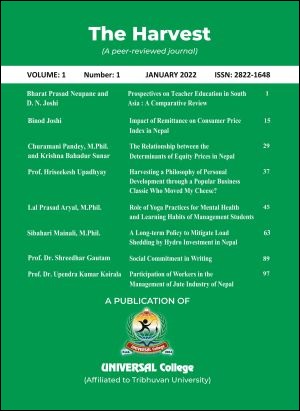Impact of Remittance on Consumer Price Index in Nepal
DOI:
https://doi.org/10.3126/harvest.v1i1.44334Keywords:
inflation, remittances, ordinary least squaresAbstract
Remittances play a significant role in the economic development of the recipient economy through different micro and macroeconomic channels. The adverse impact of remittances in the form of Dutch disease and inflation cannot be overlooked. This paper examines the impact of remittance on overall inflation measured by the consumer price index in Nepal. It applies time series data for the period 1975 to 2020. Ordinary least squared (OLS) regression method results revealed that remittances, money supply, import trade and budget deficit have a positive impact on inflation whereas the impact of real gross domestic product is negative. The impact of export trade is inconclusive. Given the inflationary nature of remittances, it becomes necessary for the government to channelize the remitted funds into productive investment to avoid a surge in demand-pull inflation.




